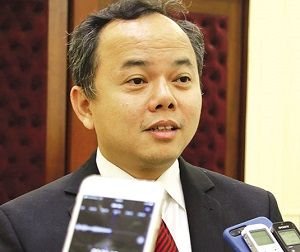The real estate market expects 2018 to be another great year for foreign investment. Lawyer Le Net of LNT and Partners spoke to VIR's Le Son about the difficulties real estate developers are facing and the legal issues they hope will be resolved this year.

Could you tell us about the conditions that have created a need for legal amendments related to the real estate sector in 2018?

There are three main issues that we anticipate to be addressed in the year ahead: the legal concern over condotels, red books for foreigners [ensuring land rights], and better control over the real estate bubble.
Condotel investors are not currently granted a pink book [conferring ownership rights for buildings], which is an issue not explicitly outlined by the law. The red book is a certificate of ownership, but it is also an administrative decision, and as such it can be cancelled if it is illegal. Therefore, it is important we have laws to confirm the legal status of the pink book regarding condotels.
Another concern that needs modification is the tax on real estate. There has been much controversy over the state’s strict stance on tax revenue. However, we also need to think about the enormous tax revenues of the second home segment.
There have been many proposals from developers on improving the business climate in 2017, hoping to make the investment environment more secure. Firstly, this safety is needed as it affects buyers who are the direct clients of the condotels or other housing units such as townhouses and villas. Once this is ensured, citizens will be more inclined to buy.
Next comes safety for banks, as the property bought by those citizens holds a huge investment value, one which they will have to pay off for many years to come. As in other countries, many people take 10-20 years to fully own their apartments. When the buyers are placing such high loan demands on the banks, we have to ensure security for them. Then, when the people are safe and the bank is safe, there are investors to think of. Investors are not necessarily only made up of the wealthy; an investor can be someone with initiative, someone who knows how to raise capital with those who have money or land. As such, if the law is adjusted to protect homebuyers, by protecting the property itself or banks in particular, the market will naturally grow.
What are the difficulties foreign developers are facing in terms of legal status?
Banks are primarily lenders, but when customers are unable to pay back debts, the state has to give them the right to handle it. Last year’s Resolution No. 42/2017/QH14 has resolved some of the bad debt problems. However, this is still only applied to domestic enterprises, with foreign investors left less recourse in dealing with their bad debt issues. The main concern is whether or not real estate mortgages should be granted to those who are borrowing to pay back bad loans.
These matters do not only concern foreign buyers, but local buyers too, as well as domestic corporations who wish to borrow from foreign financial organisations. Since they are seeking to borrow from cheaper sources, they are required to have collateral for the loan. However, using property as collateral is simply not an option with foreign banks, which is a key legal issue. So, it is important that we also assist foreign financial organisations.

What are the pros and cons regarding foreigners’ rights to house ownership?
One of the advantages for foreign real estate developers, if the red book mechanism is guaranteed, is that they will be able to offer Vietnamese real estate to overseas markets such as Singapore, South Korea, Japan, and many other countries. There will be a much wider market, or so-called ‘on-the-spot export’. Yet in order to do this, the law must remove certain restrictions, for example those which stipulate that foreigners cannot buy more than 30 per cent of apartments in a building, or no more than 250 apartments for individual housing in a residential area, equivalent to a ward administrative unit.
However, even with changes already made to the law, not many foreigners have rushed to Vietnam to buy houses. Those buying homes are, so far, only those who actually want to live in Vietnam. So why do we not grant them greater tax benefits? Because real estate is also property. Using the development of Singapore’s tax rate over time as a study is useful. Here we see the tax rate gradually changing – after one year, the tax rate is at 10 per cent, after two years it is at 8 per cent, and after five years the tax rate is at 2 per cent. Thus, housing prices do not have to increase rapidly for a boost in tax revenue to be possible.
Hi! I am a robot. I just upvoted you! I found similar content that readers might be interested in:
https://en.vietstock.vn/2018/01/real-estate-still-facing-unresolved-legal-issues-in-2018-973-305405.htm